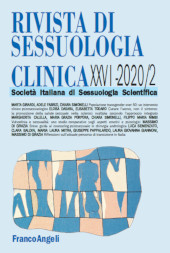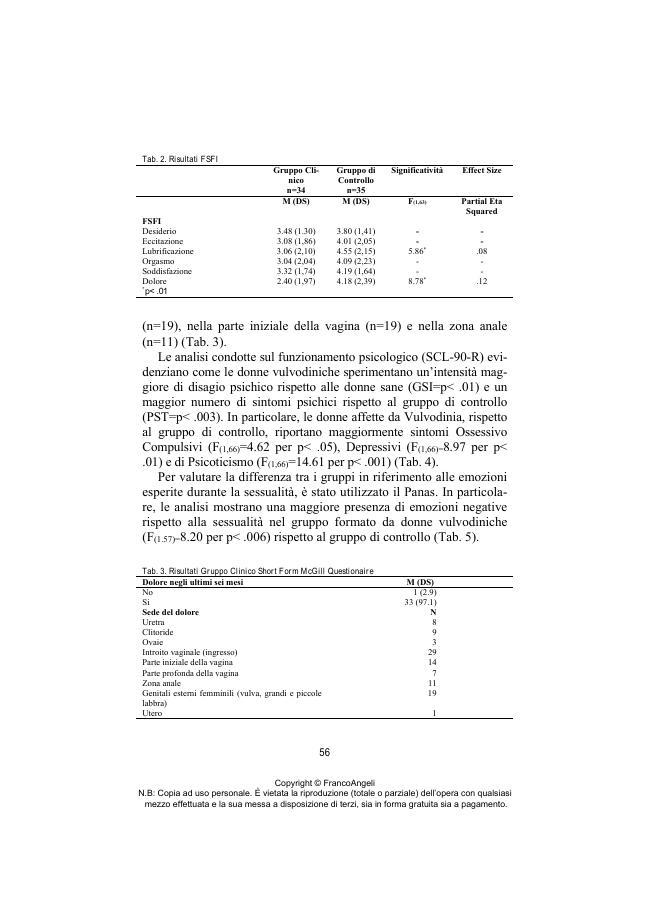Vulvodinia e sessualità : uno studio comparativo sugli aspetti emotivi e psicologici
47-64 p.
La vulvodinia è una sindrome complessa e multifattoriale che colpisce circa il 16% della popolazione femminile (Harlow et al., 2014) caratterizzata da disagio vulvare spesso descritto come bruciore/dolore che si verifica in assenza di rilevanti cause osservabili. Anche se numerosi progressi sono stati fatti nello studio di questa sindrome, esistono ancora oggi delle problematiche relative all'eziologia, che possono ulteriormente ostacolare il processo diagnostico e terapeutico. L'obiettivo del presente studio è stato quello di esplorare il funzionamento sessuale, emotivo e psicopatologico di donne affette da vulvodinia, ponendole a confronto con donne prive di patologie genito-pelviche. Lo studio è stato condotto su 69 donne che hanno compilato un questionario socio-anagrafico, il Female Sexual Function Index (FSFI), il Symptom Checklist -90- Revised (SCL-90-R), il Positive and Negati-ve Affect Schedule (PANAS) e lo Short Form McGill Questionnaire (SF-MGQ).
I risultati emersi suggeriscono nelle donne vulvodiniche la presenza di un ridotto funzionamento sessuale (maggior dolore e ridotta lubrificazione); un livello maggiore di disagio psichico (soprattutto nelle dimensioni: ossessività-compulsività, psicoticismo e depressione) ed un'affettività più negativa rispetto al gruppo di controllo. Approfondimenti futuri potrebbero contribuire ad una migliore comprensione dell'impatto che tale sindrome produce sul benessere sessuale e sulla qualità della vita delle donne che ne sono affette, indirizzando gli specialisti verso forme d'intervento multidisciplinare, che secondo il modello bio-psico-sociale, potrebbero essere più appropriate ed efficaci. [Testo dell'editore].
Vulvodynia is a complex, multifactorial and difficult to diagnose syndrome that affects approximately 16% of the female population (Harlow et al., 2014). Affected women highlight the presence of vulvar discomfort often described as burning / pain that occurs in the absence of relevant observable causes. Over time, different of definitions have been attributed to this syndrome due to the difficulties encountered by the scientific community in understanding the true nature of the pathology. At present, the definition given by the Consensus Terminology and Classification of Persistent Vulvar Pain and Vulvodynia, in April 2015, seems to be the most valid. It defines vulvodynia as "vulvar pain lasting at least three months with no clear identifiable cause but which may have potential associated factors.
Among them are mentioned various neurological, inflammatory, genetic, muscular and psychological factors that can coexist and overlap in the same patient, playing a fundamental role in the pain experience (Bornstein et al., 2016). Although numerous advances have been made in the study of this syndrome, there are still problems related to its etiology, which can further hinder the diagnostic and therapeutic process. In fact, the role played by psychological factors in the development and maintenance of vulvodynia is not yet fully understood. One wonders if the psychic factors present in these women are triggers or if they play an important role only in maintaining the syndrome. What is known for sure is that vulvodynia produces a significant negative impact on the quality of life of these women both on a sexual, that psychic and relational level.
In fact, there are many women who present catastrophic thoughts in reference to their painful condition, fear of pain with consequent dysfunctional behaviors aimed at avoiding any sexual activity and hypervigilance understood as a continuous monitoring of genital sensations (Alappattu et al., 2017; Boerner, Rosen, 2015). Furthermore, these are often wom-en who may question their sense of femininity (Mallie, Bergeron e Lambert, 2014) and develop a negative attribution style due to repeated sexual experiences that do not meet expected expectations. It follows that the negative meaning in reference to one's sexual life, generated by the painful experience, could cause a strong distress in the couple and favor the onset of anxious and depressive states present in each member of the relationship (Paquet et al., 2018).
What has been said makes reflect on the importance in considering vulvodynia through a bio-psycho-social perspective that takes into account the interaction between the various biological, psychological and social factors capable of simultaneously increasing the development and maintenance of this syndrome. Therefore, are the evaluation of personal and relational experiences linked to the sexual symptom that these women exhibit is also of fundamental importance (Tripodi et al., 2016). The target of this study is to explore the sexual, emotional and psychopathological functioning of women with vulvodynia, comparing them with women without genito-pelvic diseases. The study was conducted on 69 women who completed a socio-demographic questionnaire, the Female Sexual Function Index (FSFI), the Symptom Checklist-90-Revised (SCL-90-R), the Positive and Negative Affect Schedule (PANAS) and the Short Form McGill Questionnaire (SF-MGQ).
The results suggest the presence of a reduced sexual functioning (greater pain and reduced lubrication) in women affected by vulvodynia; a higher level of mental distress (especially in severity: obsessiveness-compulsiveness, psychoticism and depression) and a more negative affectivity than in the control group.Future investigations could contribute to a better understanding of the impact this syndrome produces on the sexual wellness and quality of life of women who are affected by it, directing specialists towards forms of multidisciplinary intervention, which according to the bio-psycho-social model, might be more appropriate and effective [Publisher's text].
Forma parte de
Rivista di sessuologia clinica : 2, 2020-
Artículos del mismo número (disponibles individualmente)
-
Información
Código DOI: 10.3280/RSC2020-002003
ISSN: 1972-5183
KEYWORDS
- Vulvodinia, dolore genito pelvico, funzionamento sessuale, funzionamento psicopatologico, aspetti emotivi, modello bio-psico-sociale
- Vulvodynia, genital pain, sexual functioning, psychopathological functioning, emotional aspects, biopsychosocial model



